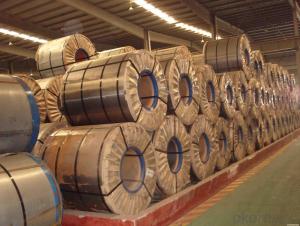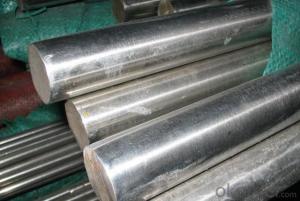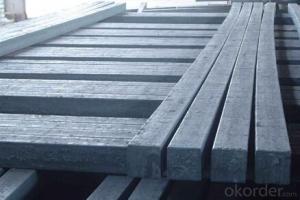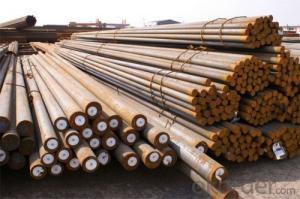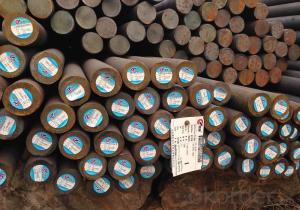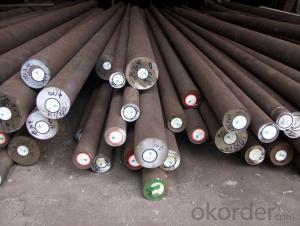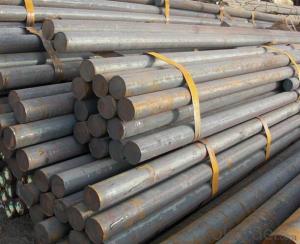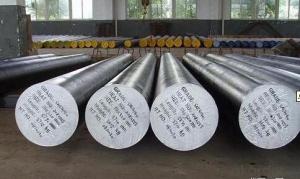DIN1.7225 Alloy Structural Steel Rod 4140 Special Steel
- Loading Port:
- China main port
- Payment Terms:
- TT OR LC
- Min Order Qty:
- 25 m.t.
- Supply Capability:
- 10000 m.t./month
OKorder Service Pledge
OKorder Financial Service
You Might Also Like
Specification
The details of our Steel
1. Produce Standard: as the GB, AISI, ASTM, SAE, EN, BS, DIN, JIS Industry Standard
2. Produce processes: Smelt Iron -EAF smelt Billet - ESR smelt Billet -Hot rolled or forged get the steel round bar and plate
3. Heat treatment:
Normalized / Annealed / Quenched+Tempered
4. Quality assurance:
All order we can received Third party inspection, You can let SGS, BV,.. and others test company test and inspect our products before Goods shipping.
Product information
Chemical Composition(%) of 4140 round steel | C | Si | Mn | P | S | Cr | Mo |
0.38-0.45 | ≤0.40 | 0.60-0.90 | ≤0.035 | ≤0.035 | 0.90-1.20 | 0.15-0.30 | |
Specification of 4140 round steel | Hot Rolled: Dia.(mm)*L(mm)=14-200*2000-6000 | ||||||
Forged: Dia.(mm)*L(mm)=210-800*2000-6000 | |||||||
Application of 4140 round steel | (1) Commonly used for manufacturing 35CrMo higher than the required strength, large parts of the important sectional dimensions, such as axis, gear, connecting rod, transmission gears, the supercharger gear, engine cylinder, spring, spring clamps, 12-2000mm oil pipe fittings, fishing tools and instead of containing nickel steel high. (2) For main shaft of steamer,boly for 400 °C. Hummar shank. | ||||||
Characteristic of 4140 round steel | (1) Chromium molybdenum high tensile steel with yield strength of 550N/mm2. (2) Chromium renders steel oil hardenable and increase hardenability. (3) Weldability suffers with increasing chromium content. (4) High temperature strength and high pressure hydrogenation properties are promoted by chromium and molybdenum. (5) Molybdenum significantly reduces temper brittleness. | ||||||
Heat Treatment of 4140 round steel | Forging:1100~900°C Normalization:860~880°C Subcritical Annealing:680~720°C Isothermal Annealing:830~900 670x3h°C Hardening:830~860 oil Tempering:550~650°C | ||||||
Mechanical Properties of 4140 round steel | Tensile str. (N/mm2):1080 Yield point (N/mm2):930 Elongation (%):12 Contraction (%):45 Impack work (J/cm2):63 Hardness (HB):217 | ||||||
Delivery Condition of 4140 round steel | hot rolled, black surface, annealed | ||||||
Payment Term of 4140 round steel | L/C at sight,T/T,30% in advance,70% before the shipment | ||||||
Product show

Workshop show

- Q: How does special steel contribute to the automotive fuel efficiency?
- Special steel contributes to automotive fuel efficiency in several ways. Firstly, it allows for the construction of lighter and stronger components, such as the body frame and engine parts, which reduces the overall weight of the vehicle. A lighter vehicle requires less energy to accelerate and maintain speed, resulting in improved fuel efficiency. Secondly, special steel can be used to manufacture components with higher precision and tighter tolerances, minimizing friction and energy loss within the engine and drivetrain. Additionally, the use of special steel in exhaust systems helps to improve the efficiency of emissions control technologies, reducing the environmental impact of the vehicle. Overall, special steel plays a crucial role in enhancing fuel efficiency by enabling the production of lighter, stronger, and more efficient automotive components.
- Q: What are the different grades of special steel?
- There are various grades of special steel, including stainless steel grades such as 304, 316, and 410, tool steel grades like D2, A2, and M2, and high-speed steel grades such as M42 and T15. Each grade has unique properties and applications, making them suitable for specific purposes in industries like construction, automotive, and manufacturing.
- Q: Can special steel be used in the telecommunications equipment manufacturing industry?
- Yes, special steel can be used in the telecommunications equipment manufacturing industry. Special steel is known for its high strength, durability, and corrosion resistance, which are important factors for the telecommunications industry. It can be used in the manufacturing of various components such as antennas, transmitters, receivers, and cables, ensuring reliable and efficient communication networks.
- Q: How does special steel perform in impact loading conditions?
- Known for its exceptional performance in impact loading conditions, special steel possesses remarkable strength, toughness, and resistance to deformation, thanks to its unique composition and manufacturing process. By effectively absorbing and dissipating energy, special steel minimizes the risk of catastrophic failure or damage when subjected to impact loading. The high strength of special steel enables it to withstand high impact forces without experiencing significant deformation or fracture, making it particularly suitable for applications where impact loading is prevalent, such as in the construction of heavy machinery, automotive components, and structural elements. In addition to its strength, special steel's toughness plays a crucial role in its performance during impact loading conditions. With excellent fracture toughness, special steel can resist crack propagation and absorb impact energy without fracturing, ensuring that it can withstand sudden and severe impacts without compromising its structural integrity. Furthermore, special steel is often subjected to treatments that enhance its resistance to impact loading conditions. Processes like heat treatment, forging, and quenching and tempering can increase the material's hardness and strength, further improving its ability to withstand impact forces. To summarize, special steel excels in impact loading conditions due to its high strength, toughness, and resistance to deformation. Its efficient energy absorption and dissipation, coupled with its resistance to fracture, make it an ideal choice for applications where impact loading is a concern.
- Q: How is case-hardening steel used in the manufacturing of gears?
- Case-hardening steel is used in the manufacturing of gears to increase their surface hardness while maintaining a tough and durable core. This process involves heating the gear in the presence of a carbon-rich gas or by immersing it in a carbon-rich environment. The carbon diffuses into the outer layer of the steel, creating a hardened surface. This hardened layer provides enhanced wear resistance and significantly extends the lifespan of the gear, making it suitable for demanding applications where gears experience high loads and friction.
- Q: Can special steel be used in the production of artistic sculptures?
- Yes, special steel can definitely be used in the production of artistic sculptures. Special steel, which refers to steel alloys that have been specifically designed and manufactured for particular applications, offers a wide range of advantages that make it suitable for creating sculptures. Firstly, special steel alloys provide exceptional strength and durability, allowing sculptors to create large and intricate structures that can withstand external forces and environmental conditions. This strength and resilience is crucial, especially for outdoor sculptures that are exposed to weather elements such as rain, wind, and extreme temperatures. Additionally, special steel alloys offer versatility in terms of shaping and forming. They can be easily molded and manipulated into various shapes and sizes, which allows artists to bring their creative visions to life. Sculptors can utilize different techniques such as welding, cutting, and bending to shape the steel into their desired forms, enabling them to create unique and captivating sculptures. Moreover, special steel alloys can be finished in various ways, such as polishing, painting, or coating, to enhance their aesthetic appeal. This allows artists to add different textures, colors, and surface finishes to their sculptures, further enhancing their artistic value. Furthermore, special steel alloys can also provide resistance to corrosion, which is particularly important for sculptures that are placed in outdoor or humid environments. This corrosion resistance ensures that the sculptures retain their visual appeal and structural integrity over time, reducing the need for frequent maintenance and repairs. In conclusion, special steel offers a wide range of advantages that make it an excellent choice for the production of artistic sculptures. Its strength, versatility, aesthetic appeal, and resistance to corrosion provide artists with the necessary tools to create visually stunning and durable sculptures that can be enjoyed for years to come.
- Q: How does special steel contribute to sustainable construction?
- Special steel contributes to sustainable construction in several ways. Firstly, it has high strength and durability, which allows for the design and construction of lighter and more efficient structures. This reduces the amount of material needed and saves resources. Secondly, special steel is often made from recycled materials, reducing the demand for virgin resources and minimizing environmental impact. Additionally, special steel can be easily recycled at the end of its life cycle, promoting a circular economy and reducing waste. Overall, special steel helps to create sustainable buildings by improving energy efficiency, reducing carbon emissions, and conserving resources.
- Q: What are the common challenges in forging special steel?
- Common challenges in forging special steel include achieving the desired grain structure, maintaining uniformity and consistency throughout the material, controlling the temperature during the forging process, preventing cracks and defects, and ensuring proper heat treatment for the desired mechanical properties.
- Q: How is special steel tested for quality control?
- Special steel is tested for quality control through various methods, such as mechanical testing, chemical analysis, and non-destructive testing. Mechanical testing involves assessing the steel's strength, hardness, toughness, and other mechanical properties through techniques like tensile, impact, and hardness testing. Chemical analysis is performed to ensure the steel meets the desired composition and impurity levels, utilizing techniques like spectrometry. Non-destructive testing methods, like ultrasonic, magnetic particle, and visual inspection, are used to detect any surface or internal defects in the steel. These rigorous testing procedures ensure that special steel meets the required quality standards before it is used in various applications.
- Q: How does special steel perform in renewable energy applications?
- Special steel performs exceptionally well in renewable energy applications due to its unique properties and characteristics. It offers high strength, durability, and corrosion resistance, making it ideal for withstanding the harsh environmental conditions typically found in renewable energy projects. Special steel is commonly used in wind turbine components, solar panel frames, hydroelectric power plant infrastructure, and geothermal power systems. Its superior mechanical properties ensure efficient energy generation and long-term performance, contributing to the overall success and sustainability of renewable energy applications.
Send your message to us
DIN1.7225 Alloy Structural Steel Rod 4140 Special Steel
- Loading Port:
- China main port
- Payment Terms:
- TT OR LC
- Min Order Qty:
- 25 m.t.
- Supply Capability:
- 10000 m.t./month
OKorder Service Pledge
OKorder Financial Service
Similar products
Hot products
Hot Searches
Related keywords
